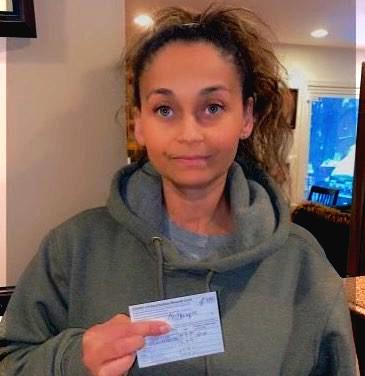Learn more about our FREE COVID-19 Patient Support Program for chronic illness patients and their loved ones.
Now that she’s vaccinated for COVID-19, Archangela Klein, 43, feels lucky — and relieved.
Archangela, who lives in Rockland County, which is a suburb to the north of New York City, is considered immunocompromised because she has lupus, an autoimmune condition that affects the joints, skin, kidneys, heart, and other organs, and other chronic conditions. She takes multiple medications that affect her immune system function, including corticosteroids and azathioprine.
As the director of ambulatory care services for a local physical rehabilitation hospital, Archangela also has a higher-than-average risk of exposure to COVID-19 infection. While the hospital doesn’t provide treatment to people with COVID-19, she works in a health care setting every day and is involved in screening people for potential COVID-19 infection.
“I could be around COVID all the time, so I have to be careful,” says Archangela, “Because of my health conditions, even a little cold could land me in the hospital. And I don’t want to have to be in the hospital right now because of the surge in coronavirus cases. I am concerned that I would be at higher risk for complications if I contracted COVID.”
Deciding to Get the COVID-19 Vaccine
Thankfully, Archangela has managed to avoid getting infected so far — and does not want to. When a vaccine became available to her, she would get it as soon as she could. “I knew that when we had access, I was taking it. If I can prevent getting COVID, I’m going to take the shot.”
Archangela first learned that she and her staff would be able to get the Pfizer COVID-19 vaccine during a recent hospital meeting. She would be able to get it on Wednesday, December 16, but she’d have to go to another nearby hospital to receive it.
When she arrived, she went through a screening process and had to fill out some paperwork. A nurse asked her a few questions about her health, including whether she had any allergies and if she was immunocompromised.
When Archangela replied yes, the nurse followed up by asking if she had spoken with a doctor and made sure she knew the vaccine has not yet been studied in people who are immunocompromised.
“I’m aware, and I’m okay with it,” Archangela replied.
What Immunocompromised Patients Need to Know About COVID-19 Vaccines
While it is true that people on immunosuppressant medications were not included in the clinical trials, this is not unusual. These medications are first studied in healthy adults and then are typically studied in special populations (such as the immunocompromised, pregnant or breastfeeding women, or children) once more is generally known about safety and effectiveness.
Because the Pfizer and Moderna vaccines are not live vaccines, there’s no reason to think they would be less safe in people on immunosuppressant medication, though they be may less effective, major medical organizations have stated.
You can read more here about getting the Pfizer vaccine or the Moderna vaccine when you’re immunocompromised.
What Getting the Vaccine Was Like
“The shot was fine — it hurt a little going in, but it basically felt like a flu shot,” says Archangela.
She had to wait for 15 minutes afterward, which is being recommended in order to monitor for potential allergic reactions. Read more here about what to know about allergic reactions and COVID-19 vaccines.
While Archangela waited, she was asked to sign up for V-Safe, a smartphone-based tool that uses text messaging and web surveys to provide personalized health check-ins after you receive a COVID-19 vaccination. V-Safe allows government health authorities like U.S. Centers for Disease Control and Prevention and the U.S. Food and Drug Administration to keep track of vaccine side effects and reactions.
Archangela gets a text from the app every day at the time that she received her vaccine — 2:30 p.m. — asking about symptoms like headache, joint pain, muscle aches, fever, pain at the injection site, and more. It also asks if any of those symptoms are mild, moderate, or severe, and whether they have affected the ability to work.
So far, Archangela has been able to report no for almost all of the listed symptoms. “The site where I got the shot has been sore, but that’s it.”
She received a card (pictured above) that says the date she received her first vaccine and the upcoming date for her next vaccine three weeks later.
What I Want Other People to Know About Getting the COVID-19 Vaccine
“I know probably not many people with my health conditions will have access to the COVID-19 vaccine for a while and I had the opportunity now,” says Archangela. “I know the vaccine was not tested in people with my health conditions or taking my medications but I wanted to get it partly to show other people like me that you can get it and still be okay.”
Archangela knows a lot of immunocompromised people are concerned about getting the vaccine, and of course, everyone may react differently to it. But she wants people to know that “my body has handled it very well. Don’t be afraid to have the shot and protect yourself” if you and your doctor agree that it’s right for you.
For her part, Archangela is looking forward to starting 2021 with the second dose of her shot in early January. “After that, I think I’ll be good,” she says.
Get Free Coronavirus Support for Chronic Illness Patients
Join the Global Healthy Living Foundation’s free COVID-19 Support Program for chronic illness patients and their families. We will be providing updated information, community support, and other resources tailored specifically to your health and safety. Join now.






